上海外语教育出版社日语综合教程(第五册)1~6课课文翻译
日语综合教程第五册第六课教学PPT课件

1
第六課 なぜ車輪動物がいないのか
•第一段至第二段 制作:刘佩璇
2
-
一、第一段落と第二段落の内 容を聴く
有名な校友
5
-
6
-
蒂姆·库克
格
兰
特
希 尔
·
校园风景
7
-
8
-
9
-Hale Waihona Puke 10-(二)、ノースカロライナ州(北卡罗来纳州)
北卡罗来纳州是美国东南部大 西洋沿岸的一个州。最初的13 州之一。北接弗吉尼亚州,东 滨大西洋,南界南卡罗来纳州 和佐治亚州,西邻田纳西州。 面积136560平方公里,在50 州内列第28位。人口970万 (2012年)。农村人口占 50%以上,为美国农村人口最 多的州之一。首府罗利 (Raleigh),最大的城市为 夏洛特。
11
-
12
-
四、単語と文法
車輪(しゃりん):車のわ 回転(かいてん):ぐるぐる回ること;投資と資金の回収 を繰り返すこと。 例:車輪が回転する
頭の回転が速い この店は客の回転が早い
車輪のお世話になっている 世話になる:人の援助を受ける。厄介を受ける。恩恵を受ける。
13
-
五、翻訳
杜克大学坐落于一个叫做达勒姆的乡村。这是北卡罗来纳州的一个有着广 阔烟叶田的宁静边远乡下。森林中仅仅零星分布着几栋建筑物,步行就能 到达的范围内什么也没有。不管是去买东西,还是送孩子上学,如果没有 车的话,那是一个很难活下去的地方。
第五册日语综合教程

窮屈 (きゅうくつ) 窄小,不舒服
団扇 (うちわ)
網棚 (あみだな) 行李架
頑丈 (がんじょう) 结实,健壮
腰板 (こしいた) 裙板,横档
歯痛 (はいた?しつう) 牙痛
気兼ね (きがね) 多心
硫酸 (りゅうさん)
堤防 (ていぼう)
沈殿地 (ちんでんち)
濾過地 (ろかち)
明言 (めいげん)
町歩 (ちょうぶ)
半永久 (はんえいきゅう)
蓑笠 (みのかさ)
境内 (けいだい)
板前 (いたまえ) 厨师
専ら (もっぱら) 专门
物言い (ものいい) 说话,异议
仕種?仕草 (しぐさ) 动作
一通り (ひととおり) 普通,一般
小父さん (おじさん)
漠然 (ばくぜん) 含糊
奥行き (おくゆき) 进深,深度
移入 (いにゅう)
目標 (もくひょう)
調和 (ちょうわ)
性急 (せいきゅう)
王座 (おうざ)
君臨 (くんりん)
二重 (にじゅう)
寸暇 (すんか)
余裕 (よゆう)
自画像 (じがぞう)
道程 (みちのり)
山道 (やまみち)
草履 (ぞうり)
鼻緒 (はなお)
崖 (がけ)
葱 (ねぎ)
丹精 (たんせい)
飢饉 (ききん)
麓 (ふもと)
椿 (つばき)
渦 (うず)
眺望 (ちょうぼう)
炎 (ほのお)
飛沫 (しぶき)
銀色 (ぎんいろ)
後日 (ごじつ)
予兆 (よちょう)
日语精读单词 上外教材 第6课

汉字一日気持ちがいい勉強始まる毎日昼休み食堂昼ご飯食べる(有时,偶尔)近い午後4時半後読む((时间)前后,左右)帰る寝る夜遅く勉強しています(但是)成績初め(然后,接着;还有)初休み(大约,左右)一緒に行く早い何時起きる大抵普段·不断土日少し朝寝坊(做,办)遅い(极限,毫无余地)寝ています早寝早起き(不,不是)(很,颇,相当)勉強家運動晩ご飯楽しい食事時間お先失礼(已经;快要;另外再)済む(还没)朝ご飯何卵一つ飲む豆乳肉饅頭お昼安い(可是)過ごす(很多)(从今以后;从现在起)(对不起)予習先帰ってください大変毎晩(这样的)見るお風呂に入る音楽聞く英文restaurantroommateclassmatetennis basketball葡pao net gamechat假名词性音调いちにち名4きもちがいい連5べんきょう名·他サ0はじまる自五0まいにち名1ひるやすみ名3しょくどう名0ひるごはん名3たべる他一2ときどき副0ちかい名·副2,1ごご名1よじはん名3あと名1よむ他五1~ごろ接尾1かえる自五1ねる自一0よるおそく名1+0,1+2べんきょうしています連しかし接2せいせき名0はじめ名0されから接0なつやすみ名3ぐらい副助1いっしょに副0いく自五0はやい形2なんじ名1おきる自一2たいてい名·副0ふだん名1どにち名0すこし副2あさねぼう名·自サ3する他サ0おそい形0ぎりぎり名·副0ねています連はやねはやおき名·自サ2,2+3いや感2,1なかなか名·副0べんきょうか名0うんどう名·他サ0ばんがはん名3たのしい形3しょくじ名·自サ0じかん名0おさき名0しつれい形動·自サ2もう副1すみました自五3まだ副1あさごはん名3なに代1たまご名2ひとつ名2のむ他五1とうにゅう名0にくまんじゅう名3おひる名2やすい形2ところで接3すごす他五2たくさん副0これから名·副0すみません挨拶4よしゅう名·他サ0さき名0かえってください連1+3たいへん形動·副0まいばん名1,0こんな連体0みる他一1おふろにはいる連2+1おんがく名1,0きく他五0假名词性音调レストラン名1ルームメート名4クラスメート名4テニス名1バスケットボール名6ペン名1ネットゲーム名4チャット名1中文一天令人舒畅努力学习开始每天午休食堂午饭吃有时,偶尔附近;不久,最近下午四点半~之后;此外读,阅读(时间)前后,左右返回,回到就寝,睡觉1+0,1+2晚上很晚在学习但是成绩初,最初然后,接着;还有暑假大约,左右一起去早的几点起床,起来大都,一般平时,平常周六和周日少量,稍许睡懒觉做,办迟的,晚的,慢的极限,毫无余地在睡觉早睡早起不,不是(表示否定或反对)很,颇,相当学习很努力地人运动晚饭愉快地吃饭,进餐时间先走一步失礼,告辞已经;快要;另外再已经解决,已经结束还没早饭什么鸡蛋一个喝,饮豆浆肉包午饭,午餐便宜的(用于转话题)可是度过很多从今以后,今后;从现在起对不起预习前方;先头;先请回去厉害的,严重的;非常每晚这样的看洗澡音乐听中文西餐馆室友同学网球篮球面包网络游戏网上聊天。
综合日语第五册课文翻译

《日语》第五册课文翻译第一课失明的高僧公元8世纪中叶。
首都奈良,这里每天热闹非凡。
东大寺这座大寺院修建的大佛终于完工。
离庆祝大佛竣工的仪式——大佛开光的日子越来越近了。
但是,庆典将至,圣武天皇正期待着一个人的到来。
“但愿他能赶上这次庆典!”这个人,圣武天皇几年前就一直翘首期盼他的到来。
但是,不知什么原因,派去迎接她的是这几年来都杳无音讯。
“他到底会不会来?能来的话,一定要赶上这个盛大的日子啊!”圣武天皇心里总惦记着这件事。
到底是谁让天皇等得如此心焦呢?故事还得从十年前说起。
那时候,中国有很多僧人东渡日本。
同样,日本每年也有一些留学僧飘洋过海到中国去。
“我希望你们能从中国带回一位高僧。
”有一年,圣武天皇委以两名留学僧这样的重托。
因为当时的日本还没有一个够资格为众僧授戒的高僧,天皇希望能从中国请到一位这样的人。
所谓戒,就是在佛教中僧人必须遵守的戒律,修行的僧人,有一些事情是禁止做的。
如果不严格遵守戒律,就不能成为一名合格的僧人。
能够遵守这些戒律的僧人才可以受戒。
佛教在日本很盛行。
有很多僧人已经具备受戒的条件,但是有资格给他们授戒的高僧却一个也没有。
来到中国的两位日本僧人,听说唐朝的扬州有一位名叫鉴真的高僧。
要是能请到这位高僧就好了,带着这样的想法,他们跋山涉水、不顾路途遥远前去拜访鉴真,言辞恳切地请求鉴真去日本。
鉴真从孩提时就诚心信佛,18岁时,已经成为一名优秀的僧人。
他看到这两位僧人不远万里,专程从隔海相望的日本前来邀请自己,被这份热诚深深打动,于是,决定东渡日本,前往那个遥远而陌生的国度。
当时鉴真已经50多岁。
因为他要去日本,所以几个弟子也要陪同前往。
他们马上动手做准备,第二年便扬帆起航,东渡日本。
但是,这次航行并非一帆风顺。
他们的船好不容易扬帆起航,不料途中遇上了狂风巨浪,幸好获救,才得以死里逃生!可刚一回到岸上,他们马上又开始张罗船只,为下一次出航做准备。
很快,一切准备就绪,他们再次出航,不料这次却又遭遇海盗打劫,被掳去很多重要物品,无奈之下只好无功而返。
日语综合教程第五册第六课教学ppt

七、まとめ
17
B
まず、アメリカのデューク大学の例を挙げって、車がなければとても 生きていけない世界を示します。
そして、日本とアメリカと比べて、車輪がなければ現代人の生活は回 転していかないということを説明します。 つまり、私たち今の生活と車輪は分けることはできない。
1
B
第六課 なぜ車輪動物がいないのか
•第一段至第二段 制作:刘佩璇
2
B
一、第一段落と第二段落の内 容を聴く
二、第一段落と第二段落の内 容を読む
3
B
三、内容を説明する
(一)、デューク大学(杜克大学)
4
B
杜克大学 (Duke University),简 称为Blue Devil,创建于1838年, 坐落于美国北卡罗莱那州达勒姆, 是一所享誉世界,风景优美的私立 男女合校研究型大学。
有名な校友
5
B
6
B
蒂姆·库克
பைடு நூலகம்
格
兰
特
·
希 尔
校园风景
7
B
8
B
9
B
10
B
(二)、ノースカロライナ州(北卡罗来纳州)
北卡罗来纳州是美国东南部大 西洋沿岸的一个州。最初的13 州之一。北接弗吉尼亚州,东 滨大西洋,南界南卡罗来纳州 和佐治亚州,西邻田纳西州。 面积136560平方公里,在50 州内列第28位。人口970万 (2012年)。农村人口占50% 以上,为美国农村人口最多的 州之一。首府罗利 (Raleigh),最大的城市为 夏洛特。
15
B
六、内容の理解と質問
2、文中の「歩いていける距離には何もない」とはどういう意 味なのか。
Gckdpo日语综合教程五六册部分课文中日对照

秋风清,秋月明,落叶聚还散,寒鸦栖复惊。
日语综合教程第五册第一课海の中に母がいる山好きの血が父方から流れているとすると、海好きは間違いなく母から伝わっている。
終戦間もなく、不忍池のほとりを通りかかると、池端に、ははがしゃがみこんで池の面をじっと見ている。
声をかけると、母は照れたような顔で立ち上げり「ちょっと海がみたくなって」と言って笑った。
当時、東大のそばに住んでいたので、買い物のついでに不忍池で休んでいたのだろうが、その時の母の言葉が妙に忘れられない。
小学六年の夏、母の故郷の鹿児島の辺鄙な漁村で一月暮らしたことがある。
母の父は背の高い、強い人で、そこでずっと医者をしていた。
家から五十メートルほどで海に出る。
桜島や開聞岳の見える美しい浜辺だった。
母が海を見たいと言ったのは、その故郷の浜辺のことを考えていたのかもしれない。
今なら二時間もかからない鹿児島は、その頃は夜行や連絡船で二日かかる遠い国だった。
望郷の思いに駆けられても当然だったような気がする。
海好きといっても、心ゆくまで海と親しんだのはその夏だけで、あとは学校から海水浴にゆく程度だった。
おそらく海と切り離された状態がかえって海への憧れを掻き立てたのだろう。
大学を出る年、なんとしても海に関係する職業につきたいと重い、日本郵船に入社できないか聞きに行った。
対応に出た人事課長は「うちも、ほかの会社と同じですよ。
文学出身では、どうもね」と気の毒がってくれた。
船会社だから、全員が船にのれるものと勘違いしていたわけだ。
それでも、船に乗って、海を思いのたけ味わいたいと言う気持ちは、いっこうに衰えなかった。
幸いフランスに行くことになり、留学生は船に乗るように、という指示があった。
マルセイユまで三十三日の船旅――考えただけでも嬉しさで気が遠くなりそうだった。
しかし仲間の留学生たちは、なんでそんな無駄なたびをさせるのか、と不満だった。
私は一人海の喜びを満喫するため、四等船室を選んだ。
综合教程第五册课文翻译

综合教程第五册课文翻译Unit1 The Fourth of July我第一次到华盛顿的时候是初夏那时我想我不应该再当一个孩子。
至少这是他们在八年级的毕业典礼上对我们说的。
我的姐姐菲利斯在同一时间从高中毕业。
我不知道她应该不再当一个什么。
但当作是送给我们俩的毕业礼物,我们全家在国庆日前往华盛顿旅游,那是传奇而著名的我国首都。
这是我第一次真正意义上在白天时乘坐火车。
当我还小的时候我们总是在夜晚乘坐运奶火车去康涅狄格海岸,因为它更便宜。
学期还没结束前家里就开始忙着准备旅行的事。
我们准备了两个星期。
父亲拿了两个大箱子和一个装满食物的盒子。
事实上,我第一次到华盛顿的旅途可以说是一个移动盛宴一在位子上安顿下来我就开始吃东西直到我们到了费城往后的某个地方才停下来。
我记得那是费城,是因为我们没有经过自由之钟对此我很失望。
母亲烤了两只鸡,然后把它们切成恰好一口一片的大小。
她打包了黑面包和黄油切片,青椒和胡萝卜条。
有来自Cushman面包店的亮黄色的周围有一圈扇贝形状的小冰蛋糕叫做“金盏花“。
有来自牛顿面包店的香辛小面包和岩皮饼,还有包裹着蛋黄酱的冰茶那是一家雷诺克斯大街上圣马可学校对面的西印度面包店。
还有母亲为我们准备的蜜桃和给父亲准备的莳萝腌菜,桃子上还有绒毛,单独包装,以免它们碰伤。
为了干净,母亲还准备了成堆的餐巾纸和一个小锡盒子里面装有浸了玫瑰水和甘油的毛巾,可以用来擦拭发粘的嘴巴。
我想要在餐车吃饭,因为我已经从书上读到过关于它们的一切,但母亲提醒了我无数次,餐车食品太贵,而且,你根本没法辨别那些食物上有谁的手在上面动过,也不知道, 之前他们的手碰过什么地方。
我的母亲从未提及过直到1947年黑人还是不被允许进入前往南部的火车餐车。
通常,无论母亲是不喜欢的或无法改变的事她都会忽视。
可能她觉得如果把注意力转开事情就会过去。
后来我知道菲利斯的高中班级旅行去的就是华盛顿,但老师们私底下又把费用还回给了她,跟她解释说,班上的孩子除了菲利斯都是白人他们将住的那家旅馆会让菲利斯不高兴。
综合教程5课文与课文翻译
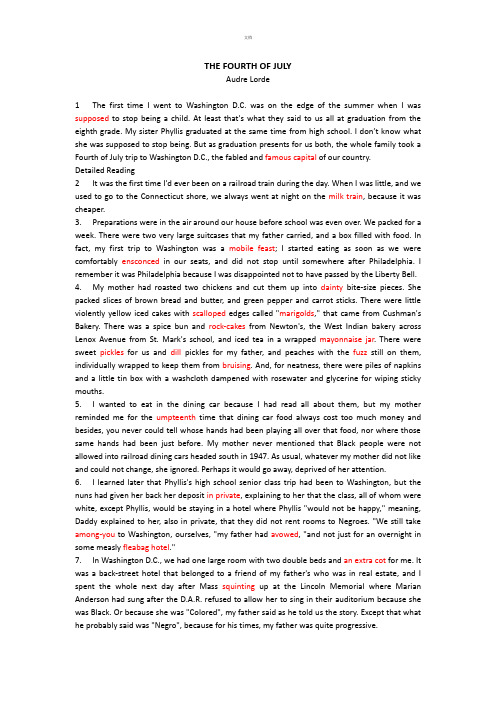
THE FOURTH OF JULYAudre Lorde1 The first time I went to Washington D.C. was on the edge of the summer when I was supposed to stop being a child. At least that's what they said to us all at graduation from the eighth grade. My sister Phyllis graduated at the same time from high school. I don’t know what she was supposed to stop being. But as graduation presents for us both, the whole family took a Fourth of July trip to Washington D.C., the fabled and famous capital of our country.Detailed Reading2 It was the first time I'd ever been on a railroad train during the day. When I was little, and we used to go to the Connecticut shore, we always went at night on the milk train, because it was cheaper.3. Preparations were in the air around our house before school was even over. We packed for a week. There were two very large suitcases that my father carried, and a box filled with food. In fact, my first trip to Washington was a mobile feast; I started eating as soon as we were comfortably ensconced in our seats, and did not stop until somewhere after Philadelphia. I remember it was Philadelphia because I was disappointed not to have passed by the Liberty Bell.4. My mother had roasted two chickens and cut them up into dainty bite-size pieces. She packed slices of brown bread and butter, and green pepper and carrot sticks. There were little violently yellow iced cakes with scalloped edges called "marigolds," that came from Cushman's Bakery. There was a spice bun and rock-cakes from Newton's, the West Indian bakery across Lenox Avenue from St. Mark's school, and iced tea in a wrapped mayonnaise jar. There were sweet pickles for us and dill pickles for my father, and peaches with the fuzz still on them, individually wrapped to keep them from bruising. And, for neatness, there were piles of napkins and a little tin box with a washcloth dampened with rosewater and glycerine for wiping sticky mouths.5. I wanted to eat in the dining car because I had read all about them, but my mother reminded me for the umpteenth time that dining car food always cost too much money and besides, you never could tell whose hands had been playing all over that food, nor where those same hands had been just before. My mother never mentioned that Black people were not allowed into railroad dining cars headed south in 1947. As usual, whatever my mother did not like and could not change, she ignored. Perhaps it would go away, deprived of her attention.6. I learned later that Phyllis's high school senior class trip had been to Washington, but the nuns had given her back her deposit in private, explaining to her that the class, all of whom were white, except Phyllis, would be staying in a hotel where Phyllis "would not be happy," meaning, Daddy explained to her, also in private, that they did not rent rooms to Negroes. "We still take among-you to Washington, ourselves, "my father had avowed, "and not just for an overnight in some measly fleabag hotel."7. In Washington D.C., we had one large room with two double beds and an extra cot for me. It was a back-street hotel that belonged to a friend of my father's who was in real estate, and I spent the whole next day after Mass squinting up at the Lincoln Memorial where Marian Anderson had sung after the D.A.R. refused to allow her to sing in their auditorium because she was Black. Or because she was "Colored", my father said as he told us the story. Except that what he probably said was "Negro", because for his times, my father was quite progressive.8. I was squinting because I was in that silent agony that characterized all of my childhood summers, from the time school let out in June to the end of July, brought about by my dilated and vulnerable eyes exposed to the summer brightness.9. I viewed Julys through an agonizing corolla of dazzling whiteness and I always hated the Fourth of July, even before I came to realize the travesty such a celebration was for Black people in this country.10. My parents did not approve of sunglasses, nor of their expense.11. I spent the afternoon squinting up at monuments to freedom and past presidencies and democracy, and wondering why the light and heat were both so much stronger in Washington D.C., than back home in New York City. Even the pavement on the streets was a shade lighter in color than back home.12. Late that Washington afternoon my family and I walked back down Pennsylvania Avenue. We were a proper caravan, mother bright and father brown, the three of us girls step-standards in-between. Moved by our historical surroundings and the heat of early evening, my father decreed yet another treat. He had a great sense of history, a flair for the quietly dramatic and the sense of specialness of an occasion and a trip.13. "Shall we stop and have a little something to cool off, Lin? "14. Two blocks away from our hotel, the family stopped for a dish of vanilla ice cream at a Breyer's ice cream and soda fountain. Indoors, the soda fountain was dim and fan-cooled, deliciously relieving to my scorched eyes.15. Corded and crisp and pinafored, the five of us seated ourselves one by one at the counter. There was I between my mother and father, and my two sisters on the other side of my mother. We settled ourselves along the white mottled marble counter, and when the waitress spoke at first no one understood what she was saying, and so the five of us just sat there.16. The waitress moved along the line of us closer to my father and spoke again. "I said I kin give you to take out, but you can't eat here, sorry." Then she dropped her eyes looking very embarrassed, and suddenly we heard what it was she was saying all at the same time, loud and clear.17. Straight-backed and indignant, one by one, my family and I got down from the counter stools and turned around and marched out of the store, quiet and outraged, as if we had never been Black before. No one would answer my emphatic questions with anything other than a guilty silence. "But we hadn't done anything!" This wasn't right or fair! Hadn't I written poems about freedom and democracy for all?18. My parents wouldn't speak of this injustice, not because they had contributed to it, but because they felt they should have anticipated it and avoided it. This made me even angrier. My fury was not going to be acknowledged by a like fury. Even my two sisters copied my parents' pretense that nothing unusual and anti-American had occurred. I was left to write my angry letter to the president of the United States all by myself, although my father did promise I could type it out on the office typewriter next week, after I showed it to him in my copybook diary.19. The waitress was white, and the counter was white, and the ice cream I never ate in Washington D.C., that summer I left childhood was white, and the white heat and the white pavement and the white stone monuments of my first Washington summer made me sick to my stomach for the whole rest of that trip and it wasn't much of a graduation present after all.我第一次去华盛顿是在那年刚入夏,这个夏天也是我从此告别孩提时代的开始。
综合教程5课文与课文翻译

THE FOURTH OF JULYAudre Lorde1 The first time I went to Washington D.C. was on the edge of the summer when I was supposed to stop being a child. At least that's what they said to us all at graduation from the eighth grade. My sister Phyllis graduated at the same time from high school. I don’t know what she was supposed to stop being. But as graduation presents for us both, the whole family took a Fourth of July trip to Washington D.C., the fabled and famous capital of our country.Detailed Reading2 It was the first time I'd ever been on a railroad train during the day. WhenI was little, and we used to go to the Connecticut shore, we always went at night on the milk train, because it was cheaper.3. Preparations were in the air around our house before school was even over. We packed for a week. There were two very large suitcases that my father carried, and a box filled with food. In fact, my first trip to Washington was a mobile feast;I started eating as soon as we were comfortably ensconced in our seats, and did not stop until somewhere after Philadelphia. I remember it was Philadelphia because I was disappointed not to have passed by the Liberty Bell.4. My mother had roasted two chickens and cut them up into dainty bite-size pieces. She packed slices of brown bread and butter, and green pepper and carrot sticks. There were little violently yellow iced cakes with scalloped edges called "marigolds," that came from Cushman's Bakery. There was a spice bun and rock-cakes from Newton's, the West Indian bakery across Lenox Avenue from St. Mark's school, and iced tea in a wrapped mayonnaise jar. There were sweet pickles for us and dill pickles for my father, and peaches with the fuzz still on them, individually wrapped to keep them from bruising. And, for neatness, there were piles of napkins and a little tin box with a washcloth dampened with rosewater and glycerine for wiping sticky mouths.5. I wanted to eat in the dining car because I had read all about them, but my mother reminded me for the umpteenth time that dining car food always cost too much money and besides, you never could tell whose hands had been playing all over that food, nor where those same hands had been just before. My mother never mentioned that Black people were not allowed into railroad dining cars headed south in 1947. As usual, whatever my mother did not like and could not change, she ignored. Perhaps it would go away, deprived of her attention.6. I learned later that Phyllis's high school senior class trip had been to Washington, but the nuns had given her back her deposit in private, explaining to her that the class, all of whom were white, except Phyllis, would be staying in a hotel where Phyllis "would not be happy," meaning, Daddy explained to her, also in private, that they did not rent rooms to Negroes. "We still take among-you to Washington, ourselves, "my father had avowed, "and not just for an overnight in some measly fleabag hotel."7. In Washington ., we had one large room with two double beds and an extra cotfor me. It was a back-street hotel that belonged to a friend of my father's who was in real estate, and I spent the whole next day after Mass squinting up at the Lincoln Memorial where Marian Anderson had sung after the refused to allow her to sing in their auditorium because she was Black. Or because she was "Colored", my father said as he told us the story. Except that what he probably said was "Negro", because for his times, my father was quite progressive.8. I was squinting because I was in that silent agony that characterized all of my childhood summers, from the time school let out in June to the end of July, brought about by my dilated and vulnerable eyes exposed to the summer brightness.9. I viewed Julys through an agonizing corolla of dazzling whiteness and I always hated the Fourth of July, even before I came to realize the travesty such a celebration was for Black people in this country.10. My parents did not approve of sunglasses, nor of their expense.11. I spent the afternoon squinting up at monuments to freedom and past presidencies and democracy, and wondering why the light and heat were both so much stronger in Washington D.C., than back home in New York City. Even the pavement on the streets was a shade lighter in color than back home.12. Late that Washington afternoon my family and I walked back down Pennsylvania Avenue. We were a proper caravan, mother bright and father brown, the three of us girls step-standards in-between. Moved by our historical surroundings and the heat of early evening, my father decreed yet another treat. He had a great sense of history, a flair for the quietly dramatic and the sense of specialness of an occasion anda trip.13. "Shall we stop and have a little something to cool off, Lin "14. Two blocks away from our hotel, the family stopped for a dish of vanilla ice cream at a Breyer's ice cream and soda fountain. Indoors, the soda fountain was dim and fan-cooled, deliciously relieving to my scorched eyes.15. Corded and crisp and pinafored, the five of us seated ourselves one by one at the counter. There was I between my mother and father, and my two sisters on the other side of my mother. We settled ourselves along the white mottled marble counter, and when the waitress spoke at first no one understood what she was saying, and so the five of us just sat there.16. The waitress moved along the line of us closer to my father and spoke again. "I said I kin give you to take out, but you can't eat here, sorry." Then she dropped her eyes looking very embarrassed, and suddenly we heard what it was she was saying all at the same time, loud and clear.17. Straight-backed and indignant, one by one, my family and I got down from the counter stools and turned around and marched out of the store, quiet and outraged, as if we had never been Black before. No one would answer my emphatic questions with anything other than a guilty silence. "But we hadn't done anything!" This wasn't right or fair! Hadn't I written poems about freedom and democracy for all18. My parents wouldn't speak of this injustice, not because they had contributed to it, but because they felt they should have anticipated it and avoided it. This made me even angrier. My fury was not going to be acknowledged by a like fury. Evenmy two sisters copied my parents' pretense that nothing unusual and anti-American had occurred. I was left to write my angry letter to the president of the United States all by myself, although my father did promise I could type it out on the office typewriter next week, after I showed it to him in my copybook diary.19. The waitress was white, and the counter was white, and the ice cream I never ate in Washington ., that summer I left childhood was white, and the white heat and the white pavement and the white stone monuments of my first Washington summer made me sick to my stomach for the whole rest of that trip and it wasn't much of a graduation present after all.我第一次去华盛顿是在那年刚入夏,这个夏天也是我从此告别孩提时代的开始。
现代日本语第五册 第一课
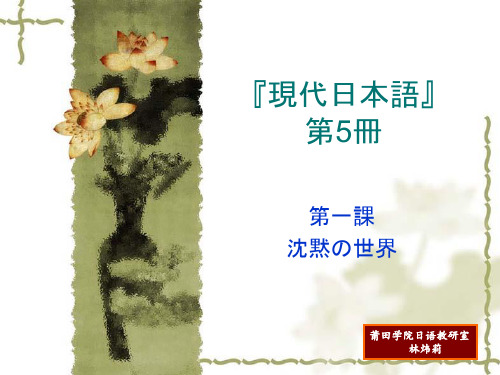
~う・ようと~う・ようと
名詞 :だろう/であろう + と 動詞 :未然形<~(よ)う> が イ形容詞:<ー[い]→かろう> ナ形容詞:<ー[な]→だろう/であろう> (注:動詞の「ない形」はイ形容詞と同じく「~ なかろう」になる)
~う・ようと~う・ようと
1.何があろうと、決して驚いてはいけないよ。 2.人に何と言われようが、気にすることはない。 3.どんなに高かろうと、どうしても手に入れた いんだ。 4.私が誰と結婚しようが、あなたにとやかく言 われる筋合いはないわ。 5.何をしようと君の自由だが、僕の邪魔だけは しないでくれ。
『現代日本語』 第5冊
第一課 沈黙の世界
莆田学院日语教研室 林炜莉
新出単語
押し潰す むっつり なおかつ 憎悪 不気味 ひたすら 押しのける いずれにせよ 自ずから 四苦八苦 押しなべて 押し分ける 譲りあう 睨みつける 関わり合い 仕掛け
文型
~う・ようはずがない あたかも ひょっとすると・したら・・・・・・かもしれない ~う・ようと~う・ようと ~以外に~(は)ない ~ようが・もない ~とされている ~に越したことはない
文法
なしに ごとし やら
言葉の使い方
もとより とりわけ いずれにせよ みちる どうにか したがって 気炎を上げる 声をかける 口にする
言語文化広場
中国と日本は一衣帯水の隣国で、いずれもアジ アの国、漢字文化圏の国、儒教文化の国である。 両国は二千年にわたる文化交流の歴史があり、お 互いに深い影響を及ぼし合って来たと言われてい る。 しかし、中国と日本は決して同文同種というよ うなものではなく、文化的にも、歴史的にも、い ろいろな違いが見られるのである。両国の言葉に ついて言えば、漢字を共有しているにもかかわら ず、中国語は中華民族の言語であり、日本語は大 和民族の言語であり、まったく系統の違った言語 なのである。
综合教程5课文与课文翻译

THE FOURTH OF JULYAudre Lorde1 The first time I went to Washington D.C. was on the edge of the summer when I was supposed to stop being a child. At least that's what they said to us all at graduation from the eighth grade. My sister Phyllis graduated at the same time from high school. I don’t know what she was supposed to stop being. But as graduation presents for us both, the whole family took a Fourth of July trip to Washington D.C., the fabled and famous capital of our country.Detailed Reading2 It was the first time I'd ever been on a railroad train during the day. WhenI was little, and we used to go to the Connecticut shore, we always went at night on the milk train, because it was cheaper.3. Preparations were in the air around our house before school was even over. We packed for a week. There were two very large suitcases that my father carried, and a box filled with food. In fact, my first trip to Washington was a mobile feast;I started eating as soon as we were comfortably ensconced in our seats, and did not stop until somewhere after Philadelphia. I remember it was Philadelphia because I was disappointed not to have passed by the Liberty Bell.4. My mother had roasted two chickens and cut them up into dainty bite-size pieces. She packed slices of brown bread and butter, and green pepper and carrot sticks. There were little violently yellow iced cakes with scalloped edges called "marigolds," that came from Cushman's Bakery. There was a spice bun and rock-cakes from Newton's, the West Indian bakery across Lenox Avenue from St. Mark's school, and iced tea in a wrapped mayonnaise jar. There were sweet pickles for us and dill pickles for my father, and peaches with the fuzz still on them, individually wrapped to keep them from bruising. And, for neatness, there were piles of napkins and a little tin box with a washcloth dampened with rosewater and glycerine for wiping sticky mouths.5. I wanted to eat in the dining car because I had read all about them, but my mother reminded me for the umpteenth time that dining car food always cost too much money and besides, you never could tell whose hands had been playing all over that food, nor where those same hands had been just before. My mother never mentioned that Black people were not allowed into railroad dining cars headed south in 1947. As usual, whatever my mother did not like and could not change, she ignored. Perhaps it would go away, deprived of her attention.6. I learned later that Phyllis's high school senior class trip had been to Washington, but the nuns had given her back her deposit in private, explaining to her that the class, all of whom were white, except Phyllis, would be staying in a hotel where Phyllis "would not be happy," meaning, Daddy explained to her, also in private, that they did not rent rooms to Negroes. "We still take among-you to Washington, ourselves, "my father had avowed, "and not just for an overnight in some measly fleabag hotel."7. In Washington ., we had one large room with two double beds and an extra cotfor me. It was a back-street hotel that belonged to a friend of my father's who was in real estate, and I spent the whole next day after Mass squinting up at the Lincoln Memorial where Marian Anderson had sung after the refused to allow her to sing in their auditorium because she was Black. Or because she was "Colored", my father said as he told us the story. Except that what he probably said was "Negro", because for his times, my father was quite progressive.8. I was squinting because I was in that silent agony that characterized all of my childhood summers, from the time school let out in June to the end of July, brought about by my dilated and vulnerable eyes exposed to the summer brightness.9. I viewed Julys through an agonizing corolla of dazzling whiteness and I always hated the Fourth of July, even before I came to realize the travesty such a celebration was for Black people in this country.10. My parents did not approve of sunglasses, nor of their expense.11. I spent the afternoon squinting up at monuments to freedom and past presidencies and democracy, and wondering why the light and heat were both so much stronger in Washington D.C., than back home in New York City. Even the pavement on the streets was a shade lighter in color than back home.12. Late that Washington afternoon my family and I walked back down Pennsylvania Avenue. We were a proper caravan, mother bright and father brown, the three of us girls step-standards in-between. Moved by our historical surroundings and the heat of early evening, my father decreed yet another treat. He had a great sense of history, a flair for the quietly dramatic and the sense of specialness of an occasion anda trip.13. "Shall we stop and have a little something to cool off, Lin "14. Two blocks away from our hotel, the family stopped for a dish of vanilla ice cream at a Breyer's ice cream and soda fountain. Indoors, the soda fountain was dim and fan-cooled, deliciously relieving to my scorched eyes.15. Corded and crisp and pinafored, the five of us seated ourselves one by one at the counter. There was I between my mother and father, and my two sisters on the other side of my mother. We settled ourselves along the white mottled marble counter, and when the waitress spoke at first no one understood what she was saying, and so the five of us just sat there.16. The waitress moved along the line of us closer to my father and spoke again. "I said I kin give you to take out, but you can't eat here, sorry." Then she dropped her eyes looking very embarrassed, and suddenly we heard what it was she was saying all at the same time, loud and clear.17. Straight-backed and indignant, one by one, my family and I got down from the counter stools and turned around and marched out of the store, quiet and outraged, as if we had never been Black before. No one would answer my emphatic questions with anything other than a guilty silence. "But we hadn't done anything!" This wasn't right or fair! Hadn't I written poems about freedom and democracy for all18. My parents wouldn't speak of this injustice, not because they had contributed to it, but because they felt they should have anticipated it and avoided it. This made me even angrier. My fury was not going to be acknowledged by a like fury. Evenmy two sisters copied my parents' pretense that nothing unusual and anti-American had occurred. I was left to write my angry letter to the president of the United States all by myself, although my father did promise I could type it out on the office typewriter next week, after I showed it to him in my copybook diary.19. The waitress was white, and the counter was white, and the ice cream I never ate in Washington ., that summer I left childhood was white, and the white heat and the white pavement and the white stone monuments of my first Washington summer made me sick to my stomach for the whole rest of that trip and it wasn't much of a graduation present after all.我第一次去华盛顿是在那年刚入夏,这个夏天也是我从此告别孩提时代的开始。
日语综合教程五(第三课)翻译及课后答案
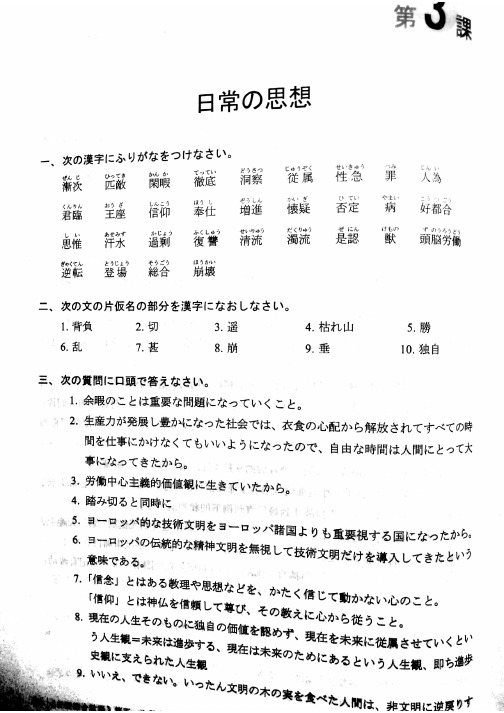
断绝 质
说们
这
闲
数
许
这种 劳动
义 值观
别
贯彻这 种 值观
维
值 给ř
评
观
换
权
认为
时断
值
产这 为
维
决
时
值观 这
为
断
东
欧
拥
军
确
为欧
学
树 论 时 还拥
劳动为 欧
种 过术
产
欧
产
标让
术
国
经 现现
谐当
视 问题
这种
对产
视 认为
这个
气
没
这种 教
画
诸国
为 欧 仅仅
军压 产惊
实现这 标 个 欧 诸 国还
难与 欧
敌与 设
随 为 个创
类 值观 这 为 尝
认为 发现协调两种对
残
Ļ
吣
当 国
团 慎
蠡裢 莒
罴
宫
筘
ľ
图
园ľ 圆
ľ
内
教 挥
ľ图 当
囤
当
内
断
围绕 渐变 论资 宁说这
认识 问题进 学
这报 给
个题
题将会
问题 这 为随 学 术 发
产 缩 类劳动时间
义国 还
会 义国
学术现
寻
为对 类
没 么从
忧
来拥
对 类来说 劳动 时
时间
东 这 为当 盯
从 劳动 仅
从
劳动 教
类 值观 为 厂劳 动 对 娱 乐
来将 现 变
观
这 现并
为现
值 过来现
新编日语教程5.1到5课课文译文
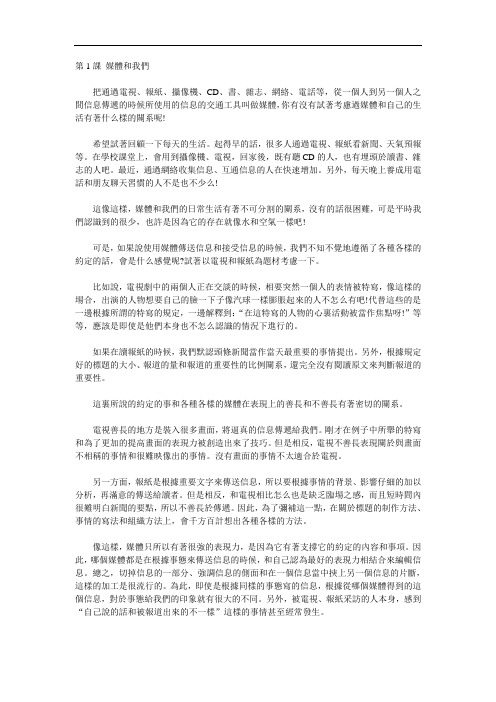
第1課媒體和我們把通過電視、報紙、攝像機、CD、書、雜志、網絡、電話等,從一個人到另一個人之間信息傳遞的時候所使用的信息的交通工具叫做媒體,你有沒有試著考慮過媒體和自己的生活有著什么樣的關系呢!希望試著回顧一下每天的生活。
起得早的話,很多人通過電視、報紙看新聞、天氣預報等。
在學校課堂上,會用到攝像機、電視,回家後,既有聽CD的人,也有埋頭於讀書、雜志的人吧。
最近,通過網絡收集信息、互通信息的人在快速增加。
另外,每天晚上養成用電話和朋友聊天習慣的人不是也不少么!這像這樣,媒體和我們的日常生活有著不可分割的關系,沒有的話很困難,可是平時我們認識到的很少,也許是因為它的存在就像水和空氣一樣吧!可是,如果說使用媒體傳送信息和接受信息的時候,我們不知不覺地遵循了各種各樣的約定的話,會是什么感覺呢?試著以電視和報紙為題材考慮一下。
比如說,電視劇中的兩個人正在交談的時候,相要突然一個人的表情被特寫,像這樣的場合,出演的人物想要自己的臉一下子像汽球一樣膨脹起來的人不怎么有吧!代替這些的是一邊根據所謂的特寫的規定,一邊解釋到:“在這特寫的人物的心裏活動被當作焦點呀!”等等,應該是即使是他們本身也不怎么認識的情況下進行的。
如果在讀報紙的時候,我們默認頭條新聞當作當天最重要的事情提出。
另外,根據規定好的標題的大小、報道的量和報道的重要性的比例關系,還完全沒有閱讀原文來判斷報道的重要性。
這裏所說的約定的事和各種各樣的媒體在表現上的善長和不善長有著密切的關系。
電視善長的地方是裝入很多畫面,將逼真的信息傳遞給我們。
剛才在例子中所舉的特寫和為了更加的提高畫面的表現力被創造出來了技巧。
但是相反,電視不善長表現關於與畫面不相稱的事情和很難映像出的事情。
沒有畫面的事情不太適合於電視。
另一方面,報紙是根據重要文字來傳送信息,所以要根據事情的背景、影響仔細的加以分析,再滿意的傳送給讀者。
但是相反,和電視相比怎么也是缺乏臨場之感,而且短時間內很難明白新聞的要點,所以不善長於傳遞。
日语综合教程第五册课后练习翻译题答案
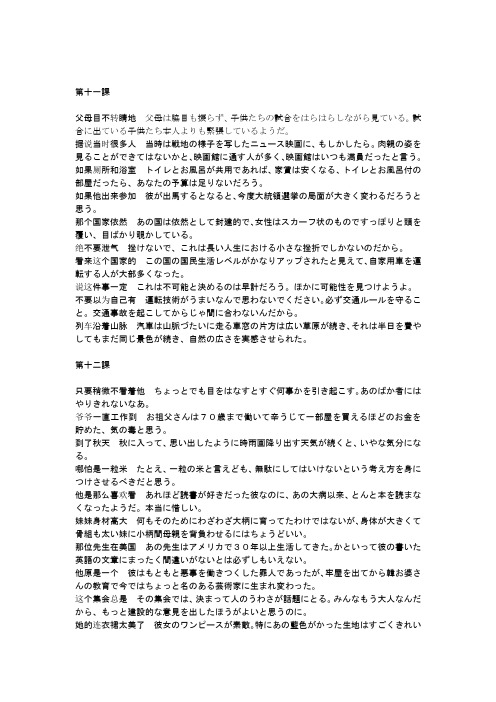
第十一課父母目不转睛地父母は脇目も振らず、子供たちの試合をはらはらしながら見ている。
試合に出ている子供たち本人よりも緊張しているようだ。
据说当时很多人当時は戦地の様子を写したニュース映画に、もしかしたら。
肉親の姿を見ることができてはないかと、映画館に通す人が多く、映画館はいつも満員だったと言う。
如果厕所和浴室トイレとお風呂が共用であれば、家賃は安くなる、トイレとお風呂付の部屋だったら、あなたの予算は足りないだろう。
如果他出来参加彼が出馬するとなると、今度大統領選挙の局面が大きく変わるだろうと思う。
那个国家依然あの国は依然として封建的で、女性はスカーフ状のものですっぽりと頭を覆い、目ばかり覗かしている。
绝不要泄气挫けないで、これは長い人生における小さな挫折でしかないのだから。
看来这个国家的この国の国民生活レベルがかなりアップされたと見えて、自家用車を運転する人が大部多くなった。
说这件事一定これは不可能と決めるのは早計だろう。
ほかに可能性を見つけようよ。
不要以为自己有運転技術がうまいなんで思わないでください。
必ず交通ルールを守ること。
交通事故を起こしてからじゃ間に合わないんだから。
列车沿着山脉汽車は山脈づたいに走る車窓の片方は広い草原が続き、それは半日を費やしてもまだ同じ景色が続き、自然の広さを実感させられた。
第十二課只要稍微不看着他ちょっとでも目をはなすとすぐ何事かを引き起こす。
あのばか者にはやりきれないなあ。
爷爷一直工作到お祖父さんは70歳まで働いて辛うじて一部屋を買えるほどのお金を貯めた、気の毒と思う。
到了秋天秋に入って、思い出したように時雨画降り出す天気が続くと、いやな気分になる。
哪怕是一粒米たとえ、一粒の米と言えども、無駄にしてはいけないという考え方を身につけさせるべきだと思う。
他是那么喜欢看あれほど読書が好きだった彼なのに、あの大病以来、とんと本を読まなくなったようだ。
本当に惜しい。
妹妹身材高大何もそのためにわざわざ大柄に育ってたわけではないが、身体が大きくて骨組も太い妹に小柄間母親を背負わせるにはちょうどいい。
综合教程5课文与课文翻译

THE FOURTH OF JULYAudre Lorde1 The first time I went to Washington D。
C。
was on the edge of the summer when I was supposed to stop being a child。
At least that's what they said to us all at graduation from the eighth grade. My sister Phyllis graduated at the same time from high school。
I don’t know what she was supposed to stop being. But as graduation presents for us both,the whole family took a Fourth of July trip to Washington D.C。
,the fabled and famous capital of our country。
Detailed Reading2 It was the first time I'd ever been on a railroad train during the day。
When I was little, and we used to go to the Connecticut shore, we always went at night on the milk train, because it was cheaper。
3. Preparations were in the air around our house before school was even over. We packed for a week。
There were two very large suitcases that my father carried,and a box filled with food. In fact, my first trip to Washington was a mobile feast;I started eating as soon as we were comfortably ensconced in our seats, and did not stop until somewhere after Philadelphia. I remember it was Philadelphia because I was disappointed not to have passed by the Liberty Bell. 4。
综合日语第5册第6课翻译
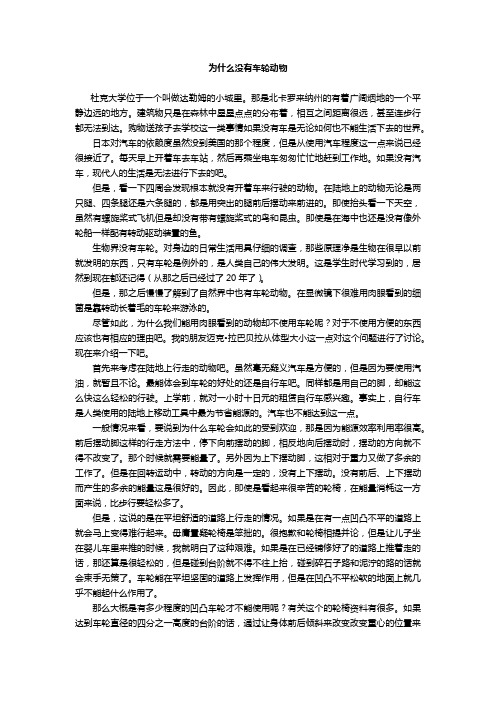
为什么没有车轮动物杜克大学位于一个叫做达勒姆的小城里。
那是北卡罗来纳州的有着广阔烟地的一个平静边远的地方。
建筑物只是在森林中星星点点的分布着,相互之间距离很远,甚至连步行都无法到达。
购物送孩子去学校这一类事情如果没有车是无论如何也不能生活下去的世界。
日本对汽车的依赖度虽然没到美国的那个程度,但是从使用汽车程度这一点来说已经很接近了。
每天早上开着车去车站,然后再乘坐电车匆匆忙忙地赶到工作地。
如果没有汽车,现代人的生活是无法进行下去的吧。
但是,看一下四周会发现根本就没有开着车来行驶的动物。
在陆地上的动物无论是两只腿、四条腿还是六条腿的,都是用突出的腿前后摆动来前进的。
即使抬头看一下天空,虽然有螺旋桨式飞机但是却没有带有螺旋桨式的鸟和昆虫。
即使是在海中也还是没有像外轮船一样配有转动驱动装置的鱼。
生物界没有车轮。
对身边的日常生活用具仔细的调查,那些原理净是生物在很早以前就发明的东西,只有车轮是例外的,是人类自己的伟大发明。
这是学生时代学习到的,居然到现在都还记得(从那之后已经过了20年了)。
但是,那之后慢慢了解到了自然界中也有车轮动物。
在显微镜下很难用肉眼看到的细菌是靠转动长着毛的车轮来游泳的。
尽管如此,为什么我们能用肉眼看到的动物却不使用车轮呢?对于不使用方便的东西应该也有相应的理由吧。
我的朋友迈克•拉巴贝拉从体型大小这一点对这个问题进行了讨论。
现在来介绍一下吧。
首先来考虑在陆地上行走的动物吧。
虽然毫无疑义汽车是方便的,但是因为要使用汽油,就暂且不论。
最能体会到车轮的好处的还是自行车吧。
同样都是用自己的脚,却能这么快这么轻松的行驶。
上学前,就对一小时十日元的租赁自行车感兴趣。
事实上,自行车是人类使用的陆地上移动工具中最为节省能源的。
汽车也不能达到这一点。
一般情况来看,要说到为什么车轮会如此的受到欢迎,那是因为能源效率利用率很高。
前后摆动脚这样的行走方法中,停下向前摆动的脚,相反地向后摆动时,摆动的方向就不得不改变了。
日语综合教程第五册课后练习翻译题答案
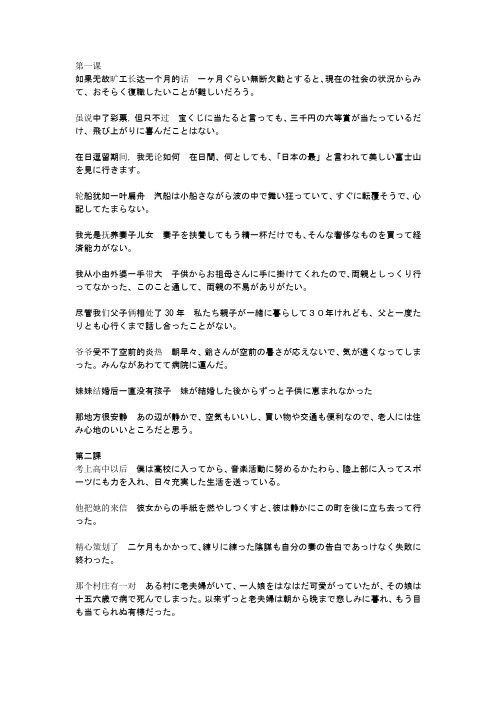
第一课如果无故旷工长达一个月的话一ヶ月ぐらい無断欠勤とすると、現在の社会の状況からみて、おそらく復職したいことが難しいだろう。
虽说中了彩票,但只不过宝くじに当たると言っても、三千円の六等賞が当たっているだけ、飛び上がりに喜んだことはない。
在日逗留期间,我无论如何在日間、何としても、「日本の最」と言われて美しい富士山を見に行きます。
轮船犹如一叶扁舟汽船は小船さながら波の中で舞い狂っていて、すぐに転覆そうで、心配してたまらない。
我光是抚养妻子儿女妻子を扶養してもう精一杯だけでも、そんな奢侈なものを買って経済能力がない。
我从小由外婆一手带大子供からお祖母さんに手に掛けてくれたので、両親としっくり行ってなかった、このこと通して、両親の不易がありがたい。
尽管我们父子俩相处了30年私たち親子が一緒に暮らして30年けれども、父と一度たりとも心行くまで話し合ったことがない。
爷爷受不了空前的炎热朝早々、爺さんが空前の暑さが忚えないで、気が遠くなってしまった。
みんながあわてて病院に運んだ。
妹妹结婚后一直没有孩子妹が結婚した後からずっと子供に恵まれなかった那地方很安静あの辺が静かで、空気もいいし、買い物や交通も便利なので、老人には住み心地のいいところだと思う。
第二課考上高中以后僕は高校に入ってから、音楽活動に努めるかたわら、陸上部に入ってスポーツにも力を入れ、日々充実した生活を送っている。
他把她的来信彼女からの手紙を燃やしつくすと、彼は静かにこの町を後に立ち去って行った。
精心策划了二ケ月もかかって、練りに練った陰謀も自分の妻の告白であっけなく失敗に終わった。
那个村庄有一对ある村に老夫婦がいて、一人娘をはなはだ可愛がっていたが、その娘は十五六歳で病で死んでしまった。
以来ずっと老夫婦は朝から晩まで悲しみに暮れ、もう目も当てられぬ有様だった。
船上广播说台風の進路からは脱することができたというアナウンスに船客一同は胸に撫で下ろした。
- 1、下载文档前请自行甄别文档内容的完整性,平台不提供额外的编辑、内容补充、找答案等附加服务。
- 2、"仅部分预览"的文档,不可在线预览部分如存在完整性等问题,可反馈申请退款(可完整预览的文档不适用该条件!)。
- 3、如文档侵犯您的权益,请联系客服反馈,我们会尽快为您处理(人工客服工作时间:9:00-18:30)。
第一课、大海中有妈妈如果说喜欢大山是继承了父亲的血统,那么爱好大海一定是从母亲那里传承下来的。
那是战争结束后不久,恰好经过不忍池附近时,妈妈会在池塘边深深蹲下,两眼死死地盯着水面。
假如我喊她,她的脸上似乎显得很难为情,站了起来,笑着说:“想看一会儿海呀!”当时,因为住在东大附近,去买东西时就顺便在不忍池休息一下,不可思议的是,我一直没有忘记那时妈妈说的话。
小学六年级的暑假,我曾去母亲的故乡,鹿儿岛上一个边远的渔村住了一个月。
外公个子高高的,非常强壮,一直在那里行医。
距家大约五十米处便是大海,从那景色秀丽的海滨,看得见樱岛和开闻火山。
母亲说想看大海,我想也许就是那故乡的海滨吧。
如是在今天,去鹿儿岛用不了两个小时,而在那时,那里是一个遥远的地方,需要坐夜间火车和联运船才能到。
在思乡之情的驱使下,似乎妈妈那种举动是理所当然的。
虽说喜欢大海,但尽情与大海亲密相处也只有在那个暑假,后来仅达到了从学校去洗海水浴的程度。
也许是因为与海隔绝的状态,反而激发起我对大海的憧憬吧。
大学毕业的那年,不知为什么,想要寻找与大海有关系的职业,便去打听能不能在日本邮船公司工作。
出来接待我的人事课长非常遗憾地说:“本公司与其他公司一样,对文学出身的大学生,一概不受。
”我将船公司误认为全体职员都在船上工作了。
尽管如此,希望乘船,我对大海的痴情却有增无减。
幸运的是,我即将去法国,根据指示,留学生将乘船前往。
去马赛有三十三天的航程——想到这个,我高兴得几乎要晕过去,可是其他留学生们不知为什么对这样耗费时间的旅行却一脸的不高兴。
我为了一个人尽情玩味航海的喜悦,选择了四等舱的铺位,那是季节工人用的船舱,留学生从不靠近,不但如此,因为在船底,靠近大海,舷窗外蓝色的波涛近在咫尺,汹涌起伏。
海上起风浪时,船员将蒙上铁皮的舷窗关死。
所谓床位,是用铁管制成的两层架子上绑上帆布,室内什么装饰也没有,简直像牢狱一样。
但是,文明的舒适环境,常常隔断了我们与大自然的直接接触。
如果说红海是炙热的话,我们所在的船底超过了四十度,而甲板上是火一样的酷暑。
不用说,一、二等舱是优雅的,有冷气的房间。
这就是康拉德所描写的热带海洋,是像粗暴的野兽一样的不可接触的实体。
如果不是在那无比强烈的、光着膀子就马上会被烫伤的太阳底下,就无法体会到红海那令人眼昏目眩的宏伟景象。
早上,我被甲板上强烈的海风吹着,喝着大杯的咖啡,感到很满足。
在中国人,马来西亚人,印度尼西亚人,越南人的嘈杂声中,我躺在甲板上读着海明威的书,开心得不得了。
我站在船首迎着海风,觉得自己简直就像大航海时代的冒险家。
东印度支那海那冷酷无情的蓝色海浪,婆罗洲海那漂浮着水母的,淡绿色的,粘乎乎的波涛,印度洋那壮丽的落日底下荡漾着金色的碎波,还有地中海那带着可怕神情的蓝黑色的浪涛——不管我走到哪里,每时每刻都在震撼着我的灵魂,无法逃脱。
从早到晚,我都站在船舷边,一刻不定地注视着那蔚蓝,广阔的大海。
我认为,人们只要长久呆在所爱的东西旁边,只要它存在就会感到幸福。
人们感到无聊,是因为失去了一味宠爱的东西吧。
在这次航海期间,我觉得自己见识了自然的美丽,同时学到了如何度过人生的方法。
从那以后,三十年过去了。
现在,当我眷恋大海的时候,就读起令人怀念的三好达治的诗。
“大海啊,在我们使用的文字中,在您之中有妈妈。
然而妈妈啊,在法国人的语言中,在您之中有海洋。
”第二课、田中正造1891年(明治二十四年)的12月25日,在日本国会召开的第二次会议上,一位五十岁左右的体格健壮的男子站在演说台前,热情洋溢的发表着对政府的质问演讲。
全场都是规规矩矩穿着西装的议员。
唯独这个男子穿的是粗制棉布的和服。
而且头发是随意散乱着的,但他却一点都不在乎。
他一边从一旁的袋子里掏出死了的鱼、枯萎的稻草等令人恶心的东西。
一边呼吁着:“在渡良濑川流域里,因为从足尾铜山的矿毒的污染,这些鱼死了,农作物枯萎了。
政府应该立刻命令停止挖掘矿石,铜山的经营者也应该赔偿农民的损失。
”这个男人就是田中正造。
为了正义和人道而奉献了自己的一生,后来被人们尊称为“明治义人”。
一打开关东地区的地图,间就能看到足尾铜山位于枥木县的西北部,在有名的中禅寺湖的附近。
虽说在江户时代就开始了矿石的开采,但却是从1877年(明治十年)被实业家买下之后,矿夫人数才渐渐超过三千,每年的铜产量也渐渐超过四十万吨。
与此同时,矿毒的危害也慢慢暴露出来了。
每当下雨的时候,毒便从废弃的矿石渣滓慢慢渗出,使得附近的渡良濑川变成青白色浑浊不堪,上万条鱼翻着白肚皮飘在水面上。
附近农田里的作物也从根开始腐烂、枯萎。
后来从1887年(明治二十年)开始,渡良濑川一带的农田收成越来越差,农民陷于穷困的底端。
1841年(天宝十二年)11月3日,在现今的枥木县佐野市出生的田中正造当时叫做兼三郎,28岁,他一直都在想:“一个人最重要的就是正直的活下去。
如果人生只有五十年的话,我已经过了一半了。
哪怕从现在开始也好,我也想要坚持着正义活下去。
”于是,他自己将名字改作正造。
此后,田中正造为了白天不能上学的青年开办了夜校,出版发行了报纸刊物《枥木新闻》,主张人民的权利,刊载对乡亲有用的消息。
但是,他坚信的却不能在社会上广泛传播。
因此田中正造在1880年(明治十三年)当选为枥木县会议员、1890年(明治二十三年)当选为众议院议员之后,决定将自己的想法运用在实际的政治中,使其发挥作用。
正是因为这样的田中正造,在如今看到陷于足尾铜山的矿毒的痛苦之中的农民之后,无法就这样沉默。
他作为农民的代表,控诉道:“从铜山上开采铜,对于可以使日本变得富强起来,确实是一件重要的事。
但是若是因此而要牺牲很多的农民,这是决定不能允许的。
”与此同时,也开始了认真研究矿毒问题起来了。
尽管田中正造在国会上热情的辩解和忠告,明治政府却说:“虽然事实上群马、枥木两县的农田的作物都枯萎了,但也不能知道就是因为足尾铜山的矿毒。
”并没有理睬这个问题。
但是田中正造却掌握有确凿的证据。
那是因为早在前几年,他就和农民们拜托农科大学(今东京大学农学部)的古在由直副教授,请他调查足尾铜山的矿石渣滓和受灾地区的土地、水之间的关系。
结果正是田中正造他们所预想的那样。
从足尾铜山流出来的水都含有大量的铜、铁和硫酸。
这就是动植物死亡的原因。
因此,田中正造在第二年五月召开的第三次会议上再次站在演说台前,用无可撼动的证据和尖锐的语言来催促政府。
政府看了科学的调查结果之后,不得不承认足尾铜山的矿毒,并提醒铜山经营公司注意。
公司最终配备了分矿采集器,处理矿石到处分散的细小的渣滓。
“已经没事了。
这些都多亏了田中大人啊。
”农民们高兴的这样说着,一边满心期待着稻子小麦的丰收。
但是,农民们的期望最终还是落空了。
分矿采集器根本就没有起到作用。
即使两年过去了,三年过去了,渡良濑川的鱼还在不停的死去,农作物的情况也没有好转。
相反的,矿毒的危害变得越来越严重了。
再加上因为矿山扩大而过度伐木的恶果,1896年(明治二十九年)的秋天,因为大雨渡良濑川的堤坝决口了,被矿毒污染的水立刻袭击的沿岸八十八个村庄,情况惨不忍睹。
田中正造又一次站在议会的演说台前,呼吁道:“要救村庄,除了停止足尾铜山的采矿之外,别无他法。
”如果像田中正造所说的那样停止采矿,却是矿害会渐渐缩小。
但是铜的产出量变少了的话,日本的国力就会变弱。
因此政府命令铜山侧建造二十所的矿毒沉淀池和过滤池。
铜山侧也明确表示:“这样一来,再也不会引起矿毒灾害了。
”农民终于可以松一口气了。
可是在1898年(明治三十一年)的9月,因为下个没停的雨,沉淀池和过滤池的堤坝变的脆弱不堪崩塌了,好不容易收集起来的矿毒也因此一下子全部流入渡良濑川里,一眨眼间,沿岸的数万町步的农田都被覆盖了。
这样一来,农作物也差不多永远都不能有收成了。
想不通的农民们在9月26日的黎明前,穿上蓑衣斗笠和新的草鞋,在渡良濑川中流的渡濑村里面的云龙寺的院子里聚集。
数量大约有一万人。
他们为了生存大举向东京出发,打算直接去和足尾铜山的经营者和政府交涉。
大约在东方开始泛白的时候,农民们开始大群的向南边移动,注意到的警察为了不让农民们进入东京,到处破坏桥梁。
因此农民们决定坐船过河,警察就拔出佩剑,总之为了将农民们赶回去,有很多人牺牲了。
这个时候的田中正造正在东京,得了感冒在旅店的屋子里躺着。
一听到这个消息就连忙跳了起来。
然后不停的催人力车加速。
在琦玉县内的渊江村和农民们会合了。
“乡亲们,请等一下。
请听我田中正造说几句。
”他张开双手去制止农民的骚乱。
之后,他又竭尽全力大声喊道:“我田中正造很理解乡亲们的愤怒。
但是,乡亲们啊,只是这样的人数去东京的话是不稳妥的啊。
即使牺牲再多的人在不能达到大家的愿望啊。
我们日本是个法治国家,我们的要求和愿望最终一定会通过议会,和平的实现的。
”听了他那真诚的一番话后,农民们都跟着这个满脸泥巴嚎啕大哭的田中正造一起哭了。
然后一边向他鞠躬一边说:“我们一直都相信田中大人。
就按他说的去做吧。
”就这样留下五十名代表,剩下的人都老实的回到村子里去了。
从那之后,为了不辜负农民的期望,田中正造夜以继日的工作。
在议会上流泪诉说连晚饭都没有的农民的悲惨,在街上,对那些关注矿毒地区的人们发表关于矿毒问题的演讲。
救助矿毒地区的运动像野火般燎然了。
人们都对矿毒地区寄予了同情,纷纷去村子里视察,赠送衣服和钱。
但是矿毒的恐怖除了实际上收到伤害的人之外,其余的人根本不了解。
那之后农民们也蜂拥向着东京去过,但是还是以牺牲众多的人而告终。
随着岁月的流逝,社会也一点一点的忘记了矿毒问题。
后来有人不禁这样说道:“提到足尾铜山的矿毒问题啊,我看那只不过是田中正造为了拉到选票而引起的骚乱罢了。
”田中正造的心变得沉重起来了。
明明一直都远离党派争斗也不顾自己的得失,只是一心为了正义而工作,可是却被人认为是为了选举所弄得活动。
而且矿毒地区的农民的生活越来越贫苦,连甘薯粥都喝不到的家庭一筹莫展不得不与家人分离甚至还要背井离乡。
“这些年,我到底都做了什么啊。
”因为痛苦,额头的皱纹更加的深了,胡子也变的全白了的田中正造抱着胳膊连续冥思苦想了好几天。
后来他终于下定决心,在1901年(明治三十四年)的秋天向众议院提交了辞职,不做议员了。
田中正造到底是为了什么而做这些的?这在当年的12月10日第十六次会议召开的当天才变的清晰起来。
当日的上午十一点二十分,天皇乘坐马车莅临开院仪式。
马车发出轻快的声音在贵族院议长的官舍前的大道上向左拐弯的时候,突然从两旁列坐的人群中跑出一个老人。
他穿着黑色木棉布制得和服,没有穿鞋,披散着头发,单手捧着一封用很大信封装的信。
嘴里叫着:“陛下求您了。
求您了。
”在马车旁守卫的骑兵拔出枪想要吓退老人,相反马却被吓得倒了下去。
与此同时,那个老人——田中正造的腿也不听使唤摔倒了。
